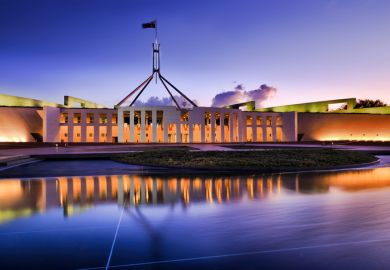Australia’s new government has dramatically watered down a controversial rule barring foreign postgraduates from changing their courses, theses or research topics without written approval from the minister for home affairs.
Under new instructions issued by the minister, Clare O’Neill, foreigners will only require her approval to change their studies from unrelated disciplines to “fields associated with certain specified critical technologies”.
Students will not need sign-off for courses or activities similar to those outlined in their original visa applications.
The requirement, which was due to apply from 1 July, will now only take effect after the minister has issued a “legislative instrument” identifying the critical technologies involved.
An explanatory statement says the new arrangements, outlined in fresh regulations, “strike an appropriate balance between the need to protect Australia’s research capabilities and promoting Australia as a destination of choice for international students”.
The change followed discussions with the Critical Technology Working Group of the Universities Foreign Interference Taskforce (UFIT). “Consultation with stakeholders indicated that there was scope to make the operation of these conditions more effective and streamlined, ensuring their targeted application in the context of managing risks to critical technologies,” the explanatory document says.
As originally framed in late March, the ministerial sign-off requirement – branded “the federal government’s most bone-headed idea ever” by Inger Mewburn, director of research training at the Australian National University – would have applied to international postgraduates making minor modifications to their study programmes.
Such modifications can occur for a multitude of reasons, such as supervisors changing jobs or PhD research encountering unexpected roadblocks.
Critics said this would have generated a huge workload for the minister, lumbering PhD students with inevitable delays that could have exhausted their scholarships and put them in breach of their visa conditions.
The requirement would have applied to students undertaking courses related to 63 different technology areas. Critics feared this left too much scope for the rule to be interpreted broadly, with benign changes to research programmes rejected by default over any connection to fields like artificial intelligence, biotechnology, advanced materials or robotics.
Many talented foreigners would have been forced to look elsewhere rather than risking doctoral studies Down Under, critics warned.
The Group of Eight said Canberra had responded to concerns the group had raised through UFIT and directly with the Department of Home Affairs. “It is important that government strikes a sensible balance between protecting critical research and safeguarding our place as world research leaders,” said chief executive Vicki Thomson.
“This is an important step in the right direction. It’s a good outcome for Australia’s research universities, our international research community and our global reputation and augurs well for a cooperative and consultative relationship going forward between Australia’s international education sector and the new government.”
Register to continue
Why register?
- Registration is free and only takes a moment
- Once registered, you can read 3 articles a month
- Sign up for our newsletter
Subscribe
Or subscribe for unlimited access to:
- Unlimited access to news, views, insights & reviews
- Digital editions
- Digital access to THE’s university and college rankings analysis
Already registered or a current subscriber?








